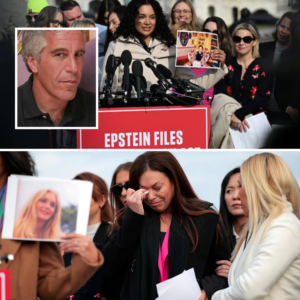On August 22, 2025, a senseless tragedy unfolded on a Charlotte, North Carolina, light rail train, shattering the dreams of a young Ukrainian refugee named Iryna Zarutska. The 23-year-old, who had fled the war-torn streets of Ukraine for a fresh start in America, was brutally stabbed to death in a random attack that stunned the nation. The suspect, Decarlos Brown Jr., a 34-year-old homeless man with a long criminal record and history of mental illness, became the focal point of a firestorm when President Donald Trump delivered a surprising and polarizing response. Speaking at a press conference and later on Truth Social, Trump called the attack “horrible” but shocked observers by admitting he hadn’t heard of the incident until questioned, promising to “know all about it by tomorrow morning.” His subsequent comments, blaming Democratic policies and vowing a federal crackdown on crime, ignited a fierce debate across social media, with X users and political figures clashing over justice, safety, and the politicization of a young woman’s death.
Iryna Zarutska’s story was one of hope cut short. A gifted artist who loved sculpting and designing clothes, she arrived in Charlotte in 2023 with her mother, sister, and brother, seeking refuge from Russia’s invasion of Ukraine. Known for her radiant smile and passion for animals, she often walked neighbors’ pets and dreamed of becoming a veterinary assistant. On that fateful evening, still in her pizzeria uniform, she boarded the Lynx Blue Line at 9:46 p.m., scrolling through her phone with headphones on, unaware of the danger seated behind her. Surveillance footage, released by the Charlotte Area Transit System (CATS) on September 6, captured the chilling moment: Brown, wearing an orange hoodie, pulled a folding knife from his pocket, stood, and stabbed Zarutska three times, at least once in the neck. As she clutched her throat, blood pooling, Brown casually walked to the other end of the train, removed his hoodie, and exited at the next stop. Passengers, frozen in shock, watched as her life slipped away. She was pronounced dead at the scene, and Brown was arrested shortly after, charged with first-degree murder.
Trump’s initial reaction came on September 7 at Joint Base Andrews, Maryland, where he landed on Air Force One. Caught off-guard by a reporter’s question about the stabbing, the president’s candid admission—“I haven’t heard… when did this happen?”—raised eyebrows. The attack, already two weeks old, had flown under his radar, a surprising lapse for a leader who has made crime a cornerstone of his 2025 agenda. Promising to be briefed by the next morning, Trump called the incident “horrible” but offered little else, leaving reporters stunned by his apparent disconnect. The moment, widely shared on X, sparked a mix of ridicule and concern, with users posting, “Trump’s out of the loop on a murder that’s got everyone talking?” and “How does the president not know this?” Yet, within hours, Trump pivoted, seizing the tragedy to fuel his narrative.
On September 8, during remarks at the Museum of the Bible in Washington, D.C., Trump doubled down, labeling the suspect a “madman” and “lunatic” while sending “love and hope” to Zarutska’s family. His tone shifted to outrage on Truth Social, where he posted a side-by-side photo of Zarutska, smiling vibrantly, and Brown, glaring in a mugshot. “I have seen the horrific video of a beautiful, young Ukrainian refugee, who came to America to escape the vicious War in Ukraine, and was innocently riding the Metro in Charlotte, North Carolina, where she was brutally ambushed by a mentally deranged lunatic,” he wrote. Blaming Democrats for “blood on their hands,” Trump zeroed in on “cashless bail” policies, claiming Brown, a career criminal arrested 14 times, should never have been free. “What the hell was he doing riding the train, and walking the streets?” he demanded, rallying supporters with calls to “lock up” such criminals. The post, amassing millions of views, set X ablaze with hashtags like #JusticeForIryna and #TrumpOnCrime.
The suspect, Decarlos Brown Jr., was no stranger to the justice system. Court records reveal a criminal history stretching back to 2011, including convictions for felony larceny, breaking and entering, and a 2015 robbery with a dangerous weapon that landed him five years in prison. Released in 2020, Brown, who is schizophrenic, faced further arrests, including a January 2025 charge for misusing 911 after claiming “man-made” materials controlled his body. Magistrate Judge Teresa Stokes freed him on a written promise to appear, a decision now under scrutiny. Brown’s mother, speaking anonymously to local media, insisted he should have been locked up, citing his mental instability. The revelation fueled Trump’s narrative, with his allies, like deputy chief of staff Stephen Miller, amplifying the attack. “The Democrat Party… is organized around the defense and protection of the criminal, the monstrous and the depraved,” Miller posted on X, while Elon Musk, a former Trump advisor, called for “expedited death penalty sentences” in cases of “unequivocal guilt.”
The tragedy became a lightning rod for America’s culture wars. Charlotte Mayor Vi Lyles, a Democrat, called Zarutska’s death a “senseless and tragic loss,” vowing to bolster transit security with more patrols and upgraded cameras. Governor Josh Stein, also a Democrat, expressed horror, pushing for more law enforcement funding. Yet, Republicans, including North Carolina Representative Brenden Jones and Florida Congressman Randy Fine, pounced, blaming “woke” Democratic policies for letting “violent criminals commit crimes with impunity.” Trump’s endorsement of Senate candidate Michael Whatley, who called the president’s response “spot on,” tied the incident to North Carolina’s 2026 Senate race, accusing former Governor Roy Cooper of enabling Brown’s release. Cooper’s campaign fired back, calling Whatley’s claims lies and touting Cooper’s record of prosecuting criminals. On X, #IrynaZarutska trended alongside AI-generated tributes to the young artist, while others shared the surveillance video—prompting Lyles to urge restraint out of respect for Zarutska’s family.
The public’s reaction was visceral. X users flooded feeds with heart emojis and calls for justice, with posts like “She escaped war only to die here—America failed her” and “Trump’s right, lock these monsters up!” Others criticized the politicization, with one user writing, “Using a young woman’s death for votes is disgusting.” The video, edited to omit the stabbing but showing Brown’s chilling calm, amplified the outrage, with influencers like Charlie Kirk and Laura Loomer decrying “soft-on-crime” policies. Yet, some questioned Trump’s motives, noting his selective focus on crimes that fit his narrative. “Where was this energy for other victims?” one X user asked, referencing declining crime rates in Charlotte, where homicides and assaults dropped from 2020 to 2024, per AH Datalytics.
Zarutska’s death exposed deeper issues: transit safety, mental health, and judicial oversight. CATS, under interim CEO Brent Cagle, tripled its safety budget and added a chief safety officer, but the absence of security in Zarutska’s train car drew ire. Brown’s schizophrenia and prior arrests raised questions about mental health interventions, with Mecklenburg County DA Spencer Merriweather noting the challenges of balancing accountability and care. Trump’s push for National Guard deployments in Democratic cities like Chicago and Baltimore, citing Zarutska’s death, alarmed critics who argued federal overreach ignores local progress. “Crime’s down, but Trump’s fearmongering is up,” one X post read, reflecting a divide between data and rhetoric.
For Zarutska’s family, the loss was unimaginable. A GoFundMe described her as a “vibrant spirit” whose artwork brought joy, now left to mourn a future stolen. Trump’s response, while heartfelt to some, felt hollow to others, overshadowed by his political jab. His promise to “handle” such “evil people” resonated with supporters but left skeptics wary of his broader agenda. As Charlotte grapples with its grief, and X buzzes with tributes and debates, Iryna Zarutska’s story endures—a haunting reminder that safety remains a promise unkept for too many.




